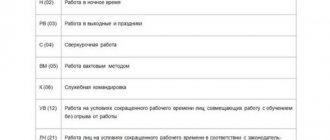What are the essential terms of the contract under 44-FZ?
If we look at 44-FZ, there is no clear indication of what terms of the contract can be considered essential. This information is contained only in the Civil Code of the Russian Federation.
According to Art. 432 of the Civil Code of the Russian Federation, essential are the conditions on the subject of the contract, the conditions that are named in the law or other legal acts as essential or necessary for contracts of this type, as well as all those conditions regarding which, at the request of one of the parties, an agreement must be reached.
Thus, the essential terms of the contract (abbreviated SCC) are those conditions without which the document is considered invalid, and also in respect of which an agreement must be reached.
What can be attributed to such conditions?
This:
- Price;
- Duration of the contract;
- Deadline for fulfilling obligations;
- Subject of the contract (name of goods, works or services);
- Quantity of goods, volume of work (services);
- Payment procedure and terms;
- Responsibility of the supplier and the Customer (amount of penalties);
- Other requirements that are significant in the context of the concluded contract.
Part 1 of Article 34 of 44-FZ states that the contract is concluded on the terms stipulated by the notice (invitation to take part in the procurement), procurement documentation, application, final offer of the procurement participant. Accordingly, the conditions specified in all these documents also apply to the SCC.
Also in paragraph 2 of the letter of the Ministry of Economic Development No. D28i-2286 dated August 3, 2015, the following is said regarding the QMS:
“Law No. 44-FZ does not disclose the content of the concept of “essential terms of the contract.” At the same time, Article 34 of Law No. 44-FZ defines the mandatory conditions for the execution of the contract.
Considering that the legislation of the Russian Federation on the contract system in the field of procurement is based, among other things, on the provisions of the Civil Code of the Russian Federation, a contract concluded within the framework of Law No. 44-FZ must contain the mandatory conditions provided for in Article 34 of Law No. 44-FZ and comply with the requirements, established by the Civil Code of the Russian Federation depending on the subject of the contract.”
In order to avoid future disputes with suppliers, some Customers directly state in the contract which conditions are essential and cannot be changed.
Who can participate in the tender?
You are a supplier, manufacturer of products or services and want to participate in procurement. What should you do next?
First of all, you need to decide whether you meet the requirements for procurement participants under 44-FZ .
The Law on Bidding establishes that participants can be representatives of small, medium and large businesses, including individual entrepreneurs and non-profit organizations.
The supplier is the person:
- no debts to the budget on taxes and fees;
- not belonging to offshore companies;
- without a criminal record (if we are talking about a legal entity, the manager and chief accountant should not have a criminal record);
- not brought to administrative responsibility during the last two years;
- not affiliated (in any way related) with the customer;
- not included in the Register of Unscrupulous Suppliers;
- not in the process of liquidation, suspension of its activities or bankruptcy;
- having no restrictions on participation in tenders regulated by legislative acts of the Russian Federation.
When submitting an application, the supplier declares compliance with the requirements. If it later turns out that he was misleading, the customer refuses to sign the contract and it ends up in the RNP. After that, all doors close in front of him.
Many suppliers do not pay serious attention to this aspect; at first, due to inexperience, they underestimate it, and then it becomes too late and nothing can be done.
About 1,000 suppliers are included in the RNP every month. Today it has more than 16 thousand entries that have been there for 2 years.
If you do not know the legislation on public procurement perfectly, have just entered this field and want to protect yourself from the risk of ending up in the RNP, it is better to use the services of professionals than to leave the field of public procurement and lose profitable contracts! Please contact us to ask any questions you may have.
Well, if you meet all the customer’s requirements, it’s time to figure out what procurements are like and how they can take place.
Changes in the essential terms of the contract under 44-FZ
As a general rule, changing the SCC under 44-FZ is not permissible. However, Article 95 44-FZ lists cases in which such conditions may be changed by agreement of the parties. The main thing is that such a possibility is provided for by the Customer in the procurement documentation and the contract itself.
So what can be changed?
- The price of the contract by agreement of the parties without changing the quantity of goods, the volume of work or services, the quality of the goods supplied, the work performed, the services provided and other terms of the contract;
- The price of the contract, if the quantity of goods, volume of work or service changes by no more than 10%.
- The contract price if regulated tariffs have changed (gas, electricity, water, heat supply);
- Price, quantity of goods (volume of work or service), deadlines for completion, if the government institution’s limits have been reduced;
- The contract price when changing the list of services when treating a citizen of the Russian Federation abroad;
- The quantity of goods supplied in an amount not exceeding the difference between the contract price proposed by the participant and the initial (maximum) contract price (lot price), if this right of the Customer is provided for in the tender documentation, auction documentation.
- The quality, technical and functional characteristics of the product towards their improvement.
Important point! You cannot make changes to the contract at the stage of signing it. Such changes are made only at the stage of its execution by signing an additional agreement by the parties.
How are procurements carried out?
The updated law on government procurement provides only electronic procurement for all types of tenders. The exception is some closed auctions.
Detailed bidding scheme:
- The customer draws up a schedule;
- Determines the type of tender;
- Determines the initial maximum contract price (hereinafter referred to as NMCP);
- Posts information about upcoming auctions;
- Places the tender itself;
- The parties sign an agreement;
- The customer determines the supplier;
- The customer accepts the completed order, and a report is drawn up based on the results.
All stages are very important, the supplier is faced with many subtleties and features at each of them, so let’s look at them in more detail.
Planning
Previously, the customer used plans to plan purchases, and on their basis prepared schedules. The new version of the law abolishes them; now planning is carried out by the customer only according to procurement plans and schedules.
There are key differences between these documents: the schedule can be changed, supplemented and expanded if necessary. This is a kind of guarantee for the performer of the seriousness of the customer’s intentions.
What is this document and why does the supplier need to know about it? The schedule is a list of purchases planned by the customer, reflected in diagrams and tables.
From the schedule, the supplier can find out:
- what exactly is planned to be purchased;
- requirements for performers;
- procurement method;
- NMCC;
- conditions for participation;
- deadlines;
- contract security;
- criteria for evaluating the result.
The next step is to determine the starting price and place a notice.
Definition of NMCC
The maximum price at which bidding will begin using the reverse auction principle is determined by the customer. The principles on the basis of which the price is set are also dictated by 44-FZ (Article 22).
The customer determines the price:
- by analyzing market prices;
- using the regulatory method (based on cost standards), which is established by Article 19 of 44-FZ;
- according to the tariff method, used for services in the field of housing and communal services, telecommunications, and the Internet;
- according to a project or estimate, used for construction services, reconstruction, overhaul, etc.;
- using a costly method if no other can be used.
You can use one or several methods in combination. Once the NMCC is determined, suppliers will reduce it. But this does not mean that the offer with the minimum price will win.
Federal Law 44-FZ provides for anti-dumping measures. If the price is reduced by more than 25% of the NMCC, the supplier must provide guarantees or confirmation of the quality of its products or work with information on the previous 3 transactions from the procurement register, and show the absence of fines and penalties for them.
And if there were no contracts in the last 12 months, you will need to prepare data on 4 previous transactions for the previous 2 years.
Publication of tender notice
At this stage, the customer places a notice in the Unified Information System. It contains the rules for identifying a supplier and key information about the tender:
- contact details of the customer and his official representing the organization in the tender;
- the main terms of the contract, what needs to be delivered and where, what service to provide or work to perform, terms, stages, place of delivery
The customer indicates the source of financing and the price, there are several options: this can be the NMCC, or the approximate value of the price, or the formula by which it is calculated.
The notice includes:
- method of selecting a performer, contractor;
- time, place and method of accepting applications;
- tender identification code, and if the purchase is carried out in accordance with Part 5, 6 of Art. 15 44-FZ, then a copy of the agreement must be attached to the notice;
- restrictions for some suppliers, if any;
- the amount of the application security for depositing into a special account or a bank guarantee;
- privileges for suppliers if the tender is carried out under Articles 28, 29 of 44-FZ;
- conditions for foreign suppliers and restrictions, if any;
- information on defense orders.
Securing the application
To participate in the tender, the contractor must contribute funds to secure the application. This is a kind of guarantee that the contractor will fulfill its obligations and evidence that the contractor has the means to fulfill the order.
If the contractor refuses to enter into an agreement, the amount is transferred to the customer as compensation, and the supplier is included in the RNP, in accordance with Art. 104 part 2.
There are two ways to secure your application: cash (transfer of the amount to a special account) or a bank guarantee.
Procurement participants can choose a specific method at their discretion. But you must open a special account; you cannot submit an application without it. Learn more about what a special account is and why it is needed.
Transferring the amount to a special account
When making a purchase, the customer indicates the amount of security for the application and the conditions under which it is accepted.
Important!
We recommend transferring funds in advance and attaching confirmation of the transfer to your participation documents. Otherwise, if the funds are not received before the customer considers the applications, the security will be considered not paid.
The amount of security is from 0.5 to 5% of the NMCC (Article 44 44-FZ):
- 0.5% -1% of NMCC for NMCC up to 20 million rubles;
- 0.5% -5% of the NMCC, if the NMCC is more than 20 million rubles.
Bank guarantee
What is a bank guarantee? This is a method of securing obligations in which the bank undertakes to pay the security amount if any problems arise with the contractor’s fulfillment of its obligations.
But the guarantee must be irrevocable so that the amount from the BG is unconditionally transferred to the customer after the contract is broken.
The list of banks that can issue a guarantee can be found on the Ministry of Finance website; it is constantly changing. The amount of the penalty has also been established; according to 44-FZ it is 0.1% of the NMCC amount.
conclusions
Law 44-FZ is a large-scale legal act (more than 250 pages), which is very difficult to review in one article. We tried to briefly highlight the main points of this law, to simply talk about complex things for “dummies.”
If you still have questions, you can take training from us on 44-FZ or order bidding support. In this case, you don’t have to worry about anything - we will carry out the procedure in full compliance with 44-FZ and guarantee the admission of your application to the auction.










